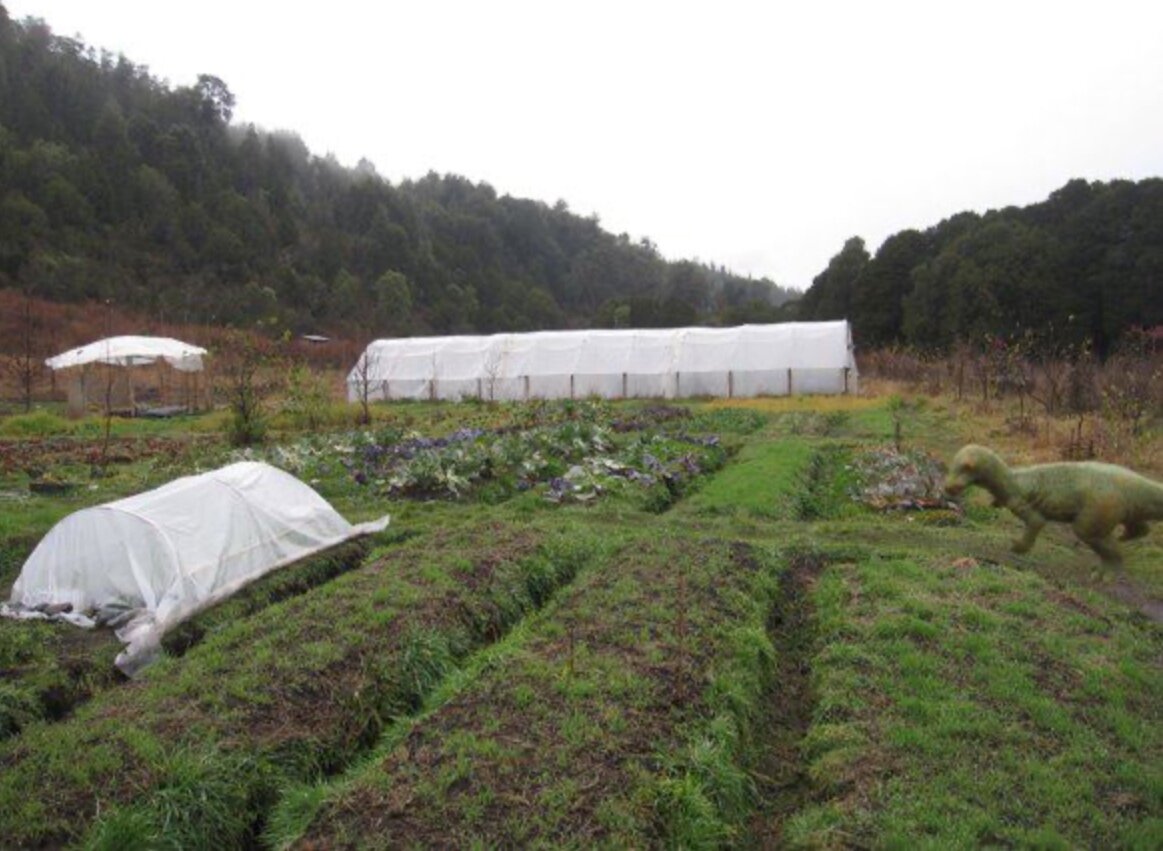THIS WEEK’S HARVEST
Spinach, Braising/Salad Mix (with Radicchio, and Mustard Greens), Assorted Head Lettuce, Collard Greens, Mixed Loose Beets, Watermelon Radishes, Purple Cabbage, Celery, Green Magic Broccoli, Leeks, Desiree Red Potatoes, Carrots, Cured Zoey Yellow Onions, Bonbon Buttercup and Delicata Winter Squash, Metechi Hardneck Garlic
The flower garden is winding down. Thank you for a magical year of flowers, Kayta!
U-PICK
Albion Strawberries: Gleanings
Herbs: Italian Parsley, Rosemary, Thyme, Tulsi Basil, Thai Basil, Oregano, Marjoram, Onion Chives, Garlic Chives, Vietnamese Coriander, Culinary Lavender, French Sorrel, Lemon Verbena, Lemon Balm
Flowers Update: It is time for cover crop — and slowly but surely we will start taking out our beloved flowers and putting the garden to bed!
HARVEST NOTES
Watermelon Radishes: This is a hardy, dense, and gorgeous winter radish with a vivid magenta inner core. We love it on top of a green salads, rice bowls or highlighted as a small salad of its own — try ginger, garlic and lime or lemon juice on julienned or sliced watermelon radishes as a bright side dish.
LOGISTICS
The 2020 harvest season runs from Saturday, June 13th til Tuesday, December, 8th.
Saturday pick-up runs from 9:00am - 2:00pm
Tuesday pick-up runs from 1:00 pm - 6:00 pm
The farm and u-picking are open 7-days a week, sunrise to sunset. Please close the farm gates behind you on off days.
VOLUNTEERING
Thank you SO much, to everyone who came out to help harvest our Fall carrots. We simply could not have brought in that crop without your help. And it was a joy to spend time in the dirt with you all.
Join us for more fun in the dirt…
MORE CARROTS and GARLIC POPPING!
WEDNESDAY, NOVEMBER 11th: 9:00 am - 12:00 PM
CARROTS AND GARLIC PLANTING (PROBABLY!)
WEDNESDAY, NOVEMBER 18th: 9:00 am - 12:00 PM
FARMER’S LOG
LETTERS FROM PATAGONIA
The harvests keep on rolling! This week was all about carrots, carrots, carrots. With the help of a small classroom-sized flock of amazing kiddos, we harvested (and washed) all but one of our 6 beds of Bolero storage carrots — sweetened by frost and the loving hands of volunteers.
The Root Blaster 5000 was humming all Wednesday and Thursday morning washing them up, and now both of our coolers are stacked to the ceiling with ~4,000 lbs of orange crispness — we hope you like carrots! Fun fact: This carrot variety, Bolero, actually gets sweeter with frost and with storage.
We’ve got a lot going on this evening, so we’ll do a copy-and-paste of an old newsletter for your reading pleasure.
* * * * *
David here.
When I was 26, I took a trip to Patagonia, Argentina. Outwardly, I was traveling — backpacking in the Andes for the purposes of “adventure”. But inwardly I was searching for something I could not explain at the time: Rootedness. Meaningful work. Purpose.
I had never harvested a cabbage before in my life, but by luck I ended up on a tiny off-grid CSA farm on the Eastern slopes of the Andes and found what I was looking for. During that trip, I would write long, maté caffeinated letters to a friend from home. Down below is one from the end of my stay on the farm. It is angsty and verbose, but describes why and where I fell in love with harvesting cabbages.
* * * * *
June, 2011
“When the sun rises, I go to work.
When the sun goes down, I take my rest
I dig the well from which I drink,
I farm the soil that yields my food,
I share in creation. Kings can do no more.”
-Unknown Author, Ancient Chinese, 2,500 B.C.
Dear Theresa,
It is nearly winter here now. I can see my breath in the cabin. Things are quiet on the land. I am spending the days caring for the animals, trying to trap the wild hares eating our last crops, baking bread like an old Grandma, and doing other random projects to help Alex [the farmer] wrap up the season. A spokeswoman for the local Mapuche tribe just passed through and spent the night. A Gaucho folk guitarist the next. My friend Ponta, a Japanese orphan who has had the hardest life I have ever heard, just left for Peru. I will miss her. One of our dogs is very sick. Another is pregnant. The Puyehue-Cordón Caulle volcano is exploding 200 kilometers to the North. I can hear it in my cabin on still nights, like stampeding horses in the earth. Life and death are tangible forces out here.
It’s all quite primal and romantic, but I think it has done something deeper to me and made me realize some things. It might be hard to capture into words.
We have no electricity out here, no hot water, all the farming is done by hand. The only machines we have are a chainsaw, a weedwacker, and a dirt bike for town trips, “All you need!” says Alex. A sweet, spindly old horse named Petiso will pull a harrow for us in exchange for a bucket of oats and complete freedom to roam the valley with his feral friends the rest of the time. All the buildings and ovens here are cob and built by Alex and his brother. Three beloved dogs, Michay (wild like the native plant she is named after), her brother Pirata (a gentle pirate), and Tao (their mother), escort us everywhere. They sleep under my cabin at night and guard the garden from the feral horses. We harvest every Wednesday for the CSA members. Their children come and play with their food and chase the chickens. There is so much simplicity here; so much poetry..
You and I have always felt called by nature — to the tangy mountain air, to the oak meadows — these places have felt like home. But we inevitably find ourselves pulled back along auto-littered highways to the turmoil, cement, and grid of the city. There awaits the hidden pressure to specialize in one thing to pay for “necessities” that are piped to us. If we succeed, we make more and can spend more, so we travel back to visit the tangy mountain air, to run our eyes enviously over the ranging hills, only to come back. Did we share in creation?
On the road back to the farm. The Río Azul and the Andes in the background.
Working on this farm has put me in forceful contact with the sources of my life — death, water, soil, the plants, the animals — and a realization that these things are not commodities, they are not necessities. They are us. They are our brothers, our sisters, our teachers. Kin. To work with them is to work with creation.
The farmer, Alex, is a goofy guy but he very serious about one thing: The farm is an organism but he does not create it. He may have a vision for the farm, but after that he is a vessel, a butler, a steward: And this is how he should work the land, coaxing it, observing, responding, moving this there, maybe taking that away. And then, one day, as if by magic, the organism reveals itself to him as he sits back peeling an apple, watching in awe the creativity and richness of life weaving itself through the fields, writing it's stories in the rows, playing it's song in the seasons. The blossoms, bees, fruits, fungi, bacteria, the animals, the people, the stars, the moon and the movements and arcs of all their lives, and all their far flung interactions, alight the farm. This symphony is also a dissonant song of chaos, poop, death and decay. But Death, the richest of masses (Mozart's richest Mass is his Requiem Mass), is the bed upon which joy and new life burst forth again and again.
Working here I’ve realized some things about culture, and art. Agriculture, or tending the wild, or however a group of people survive in their land is the root of that people — it is their original art. Take the Mongols: The art they developed for surviving that steppe is inextricably woven into the fabric of their lives. It is their houses (the collapsable yurt), it is the fiber of their walls and the clothes they wear; the tools they handle everyday. It is the animals they interact with and talk to, what they talk about with each other, what they dream about. It is the substrate of their myths, their legends, their stories and their songs and it is the material that makes up their instruments. Our art of survival is the stage and the prop and script of our lives. Although it may seem to be the case, we are no different today. We have not emancipated ourselves from the land under our feet and how we choose to cultivate it. It makes up the fabric of our lives too.
Before coming here, the word "farm" sent a chill down my spine. Why? To me, it meant mono crops; acres upon acres of almond trees. Endless fields of corn. Temp wage labor. Agribusiness. It was artless, fragmented, socially and environmentally exploitative. What it took from from the soil it did not give back. Anonymous desire.
This agricultural system is in the fabric of our culture. And it is global. Many people don't know their place, or where they come from, or their place and what they do is unknown to them. As American and Chinese agribusiness have slowly begun mono-cropping swaths of Argentina and Chile, so has American culture taken root in many South American cities. I don't think it's a coincidence that people started wearing the same clothes in Los Angeles, Buenos Aires, and Santiago, and started building similar houses, and started dreaming similar dreams, around same time that those countries adopted, or were forced to adopt, Western agribusiness, its methods, and its seeds. In a certain reverse way, the art of how a culture sustains itself is a mirror on that culture... I'm not saying the reflection I'm seeing is all bad, but is this how we want to live?
The raised bed garden of La Granja Valle Pintado. We had a dinosaur problem.
What I've seen here in the Painted Valley is beautiful art. It sustains many, and is sustained by the beings it sustains. The human culture around the farm hums with life. The farm has an identity, it is a home to so many. People seek refuge here almost daily. Economically and socially the farm works through mutualism. The association of families who support the farm are most concerned with the long term health of the farmland and the farmer — as they should be, it is their sustenance. And so the farm’s produce, its vegetables, are priced with that in mind. In this sense, they are priceless. The farm itself is an ecosystem. Nothing is wasted, waste becomes new life. The air and leaf litter and creatures of the surrounding wild permeate the farm — which is like a slightly more organized emanation of it.
One evening after work, I was putting away some tools, and Alex walked over, pumping his arms in the air and yelling, "I love life in the campo [field]! I love life in the campo!”
"Me too!" I laughed.
Alex got serious all of a sudden and stared inwardly out at the small winter field of rye spreading before us. He was silent for awhile. Finally, he said quietly to me, but also to himself, “It is the art of life and death, you know. Nothing more and nothing less."
* * * * *
See you in the campo,
David & Kayta





